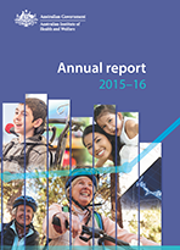AIHW Director’s report
I was delighted to be appointed as Director of the AIHW, an organisation admired as a national asset. It has a vital role to perform, highly skilled and experienced staff and a future full of opportunity. It is my privilege to join the Institute and be able to report here on its 29th year. I would like to thank Ms Kerry Flanagan and Mr Andrew Kettle for acting in the role during the year and for maintaining the AIHW's reputation for producing high-quality, relevant, accessible, useful and independent data and analysis. This occurred against the backdrop of some uncertainty about the organisation's future directions.
Before joining the AIHW, I held the role of Deputy Secretary, Health and Information, at the Department of Human Services (DHS) for 2.5 years. Before this, I was the deputy looking after the welfare program management side of DHS' business. I have a strong interest in how government data can be used for public good and while at DHS was co-chair of the Commonwealth Deputy Secretaries Data Working Group, a role that I continue to hold.
Since joining the AIHW, I have received tremendous support from our highly qualified and dedicated staff. Our work entails a full spectrum of activities, such as establishing nationally consistent data standards and classifications, collecting information from a variety of sources, quality assurance, data reporting and analysis and data linkage. The AIHW collaborates well with data providers and stakeholders to build common ownership of data improvement strategies. The products delivered in 2015–16, and described elsewhere in this annual report, are of high calibre and, I notice, trusted as authoritative sources of information.
Our resources
In 2015–16, around 32% of our budget was provided as ongoing funding, with nearly 65%—$31.3 million—provided via 'at risk' contract work, mainly from Commonwealth and state and territory governments. This provides a sometimes challenging and unpredictable environment in which we currently manage employment of 347 staff to deliver our work, of which 310 are active staff.
The AIHW continues to operate within the level of resources allocated to it by government and our external funding providers. In 2015–16, we made a small surplus despite a reduction in revenue for project work undertaken for external agencies of about $1.0 million caused mainly by funding ceasing for a small number of projects.
Integration of functions from the National Health Performance Authority
After considering several options for the future of the AIHW and several other small agencies in the Health portfolio, the Australian Government decided to close the National Health Performance Authority (NHPA) with effect from 1 July 2016 and transfer its functions to the AIHW and the Australian Commission on Safety and Quality in Health Care. The AIHW worked cooperatively with the Department of Health, NHPA and the commission on a transition plan. The AIHW will take over NHPA's role to report on the Performance and Accountability Framework (PAF) for the health system, with the AIHW's annual appropriation increasing by about $11 million. Relevant state and territory departments have agreed to transfer data from the NHPA to the AIHW and the Council of Australian Governments' Health Council has agreed to the AIHW's 2016–17 PAF Data Plan. The AIHW has created a PAF Jurisdictional Advisory Group to replace NHPA's PAF Jurisdictional Advisory Committee.
To ensure business continuity, the AIHW created a new Health Performance and Accountability Framework Group in April 2016 and 20 staff voluntarily transferred from the NHPA to the new group in the AIHW. We are keen to learn from how the NHPA operated and during 2016–17 the new group will work more closely with other groups in the AIHW who do similar work. This annual report does not reflect the activities of the new group, though Chapter 5 Our people includes numbers associated with transferred staff.
Our future
During the year, the Department of Health commissioned a review of the AIHW by external consultants. The reviewers met with many internal and external stakeholders and considered the AIHW's external environment, its role, business model, governance and processes. Their findings and recommendations have been presented to the AIHW Board and senior executive, but the report remains under embargo.
During 2016–17, the AIHW will work with the Department of Health to prepare and implement a change management plan based on the consultants' recommendations. This will be followed by revision of our strategic directions and corporate plan.
More broadly, the Institute is keen to do everything it can to assist implementation of the Australian Government's Public Data Policy Statement issued in December 2015. The policy focuses on the increasing potential value of data amid increasing data volumes, including its value in stimulating innovation, and on the publishing, linking and sharing of appropriately anonymised government data.
The AIHW is ideally placed to grasp the opportunities presented by a dynamic and changing business environment, and we look forward to further success in the year ahead.

Barry Sandison
Director



